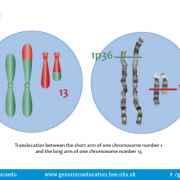Definition
A type of genetic variant where part of one chromosome has moved, usually to another, non-homologous, chromosome. Rarely, it can also move to another part of the same chromosome. In both cases, there is no net loss or gain of genetic material.
Use in clinical context
Balanced translocations have no apparent effect on an individual, as no genetic material is gained or lost. However, as with all types of translocations, there is the chance that there is a gene or other functional part of the genome at the break point, and if this is disrupted it can have phenotypic implications.
Due to random assortment during meiosis, a balanced translocation in an individual may not be passed onto offspring in the same way; thus it can become unbalanced with phenotypic consequences.
It is possible to see large translocations using karyotyping. Smaller translocations can be detected using microarrays and sequencing.
Related terms
Chromosome | Deoxyribonucleic acid (DNA) | Gene | Genetic/genomic variation | Genome | Karyotype | Microarray | Phenotype | Protein | Sequencing | Translocation





